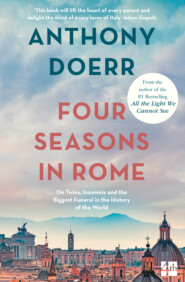По всем вопросам обращайтесь на: info@litportal.ru
(©) 2003-2024.
✖
All the Light We Cannot See
Настройки чтения
Размер шрифта
Высота строк
Поля
Didn’t she presume she would live with her father in Paris for the rest of her life? That she would always sit with Dr. Geffard in the afternoons? That every year, on her birthday, her father would present her with another puzzle and another novel, and she would read all of Jules Verne and all of Dumas and maybe even Balzac and Proust? That her father would always hum as he fashioned little buildings in the evenings, and she would always know how many paces from the front door to the bakery (forty) and how many more to the brasserie (thirty-two), and there would always be sugar to spoon into her coffee when she woke?
Bonjour, bonjour.
Potatoes at six o’clock, Marie. Mushrooms at three.
Now? What will happen now?
Making Socks (#ulink_40ac1442-33c7-513d-bcce-29fb0c0b482c)
Werner wakes past midnight to find eleven-year-old Jutta kneeling on the floor beside his cot. The shortwave is in her lap and a sheet of drawing paper is on the floor beside her, a many-windowed city of her imagination half-articulated on the page.
Jutta removes the earpiece and squints. In the twilight, her wild volutions of hair look more radiant than ever: a struck match.
“In Young Girls League,” she whispers, “they have us making socks. Why so many socks?”
“The Reich must need socks.”
“For what?”
“For feet, Jutta. For the soldiers. Let me sleep.” As though on cue, a young boy—Siegfried Fischer—cries out downstairs once, then twice more, and Werner and Jutta wait to hear Frau Elena’s feet on the stairs and her gentle ministrations and the house fall quiet once more.
“All you want to do are mathematics problems,” Jutta whispers. “Play with radios. Don’t you want to understand what’s happening?”
“What are you listening to?”
She crosses her arms and puts the earphone back and does not answer.
“Are you listening to something you’re not supposed to be listening to?”
“What do you care?”
“It’s dangerous, is why I care.”
She puts her finger in her other ear.
“The other girls don’t seem to mind,” he whispers. “Making socks. Collecting newspapers and all that.”
“We’re dropping bombs on Paris,” she says. Her voice is loud, and he resists an urge to clap his hand over her mouth.
Jutta stares up, defiant. She looks as if she is being raked by some invisible arctic wind. “That’s what I’m listening to, Werner. Our airplanes are bombing Paris.”
Flight (#ulink_c0b59db7-fd4d-5a5f-8495-f61e6a266f34)
All across Paris, people pack china into cellars, sew pearls into hems, conceal gold rings inside book bindings. The museum workspaces are stripped of typewriters. The halls become packing yards, their floors strewn with straw and sawdust and twine.
At noon the locksmith is summoned to the director’s office. Marie-Laure sits cross-legged on the floor of the key pound and tries to read her novel. Captain Nemo is about to take Professor Aronnax and his companions on an underwater stroll through oyster beds to hunt for pearls, but Aronnax is afraid of the prospect of sharks, and though she longs to know what will happen, the sentences disintegrate across the page. Words devolve into letters, letters into unintelligible bumps. She feels as if big mitts have been drawn over each hand.
Down the hall, at the guards’ station, a warder twists the knobs of the wireless back and forth but finds only hiss and crackle. When he shuts it off, quiet closes over the museum.
Please let this be a puzzle, an elaborate game Papa has constructed, a riddle she must solve. The first door, a combination lock. The second, a dead bolt. The third will open if she whispers a magic word through its keyhole. Crawl through thirteen doors, and everything will return to normal.
Out in the city, church bells strike one. One thirty. Still her father does not return. At some point, several distinct thumps travel into the museum from the gardens or the streets beyond, as if someone is dropping sacks of cement mix out of the clouds. With each impact, the thousands of keys in their cabinets quiver on their pegs.
Nobody moves up or down the corridor. A second series of concussions arrives—closer, larger. The keys chime and the floor creaks and she thinks she can smell threads of dust cascading from the ceiling.
“Papa?”
Nothing. No warders, no janitors, no carpenters, no clop-clop-clop of a secretary’s heels crossing the hall.
They can march for days without eating. They impregnate every schoolgirl they meet.
“Hello?” How quickly her voice is swallowed, how empty the halls sound. It terrifies her.
A moment later, there are clanking keys and footfalls and her father’s voice calls her name. Everything happens quickly. He drags open big, low drawers; he jangles dozens of key rings.
“Papa, I heard—”
“Hurry.”
“My book—”
“Better to leave it. It’s too heavy.”
“Leave my book?”
He pulls her out the door and locks the key pound. Outside, waves of panic seem to be traveling the rows of trees like tremors from an earthquake.
Her father says, “Where is the watchman?”
Voices near the curb: soldiers.
Marie-Laure’s senses feel scrambled. Is that the rumble of airplanes? Is that the smell of smoke? Is someone speaking German?
She can hear her father exchange a few words with a stranger and hand over some keys. Then they are moving past the gate onto the rue Cuvier, brushing through what might be sandbags or silent police officers or something else newly planted in the middle of the sidewalk.
Six blocks, thirty-eight storm drains. She counts them all. Because of the sheets of wood veneer her father has tacked over its windows, their apartment is stuffy and hot. “This will just take a moment, Marie-Laure. Then I’ll explain.” Her father shoves things into what might be his canvas rucksack. Food, she thinks, trying to identify everything by its sound. Coffee. Cigarettes. Bread?
Something thumps again and the windowpanes tremble. Their dishes rattle in the cupboards. Automobile horns bleat. Marie-Laure goes to the model neighborhood and runs her fingers over the houses. Still there. Still there. Still there.
“Go to the toilet, Marie.”
“I don’t have to.”
“It may be a while until you can go again.”
He buttons her into her winter overcoat, though it is the middle of June, and they bustle downstairs. On the rue des Patriarches, she hears a distant stamping, as though thousands of people are on the move. She walks beside her father with her cane telescoped in one fist, her other hand on his rucksack, everything disconnected from logic, as in nightmares.
Right, left. Between turns run long stretches of paving stones. Soon they are walking streets, she is sure, that she has never been on, streets beyond the boundaries of her father’s model. Marie-Laure has long since lost count of her strides when they reach a crowd dense enough that she can feel heat spilling off of it.









